-
Train No-Ride list proposed to enhance train security
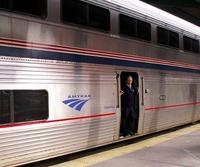
Senator Charles Schumer (D-New York) proposes creating a train No-Ride list to bolster train security; the proposed new screening process would require passengers, who already have to give their name when purchasing tickets for the train, to show photo ID before boarding; the IDs would be compared to the name on their ticket and matched against a list of known or suspected terrorists; if there is a match, that passenger would be prevented from traveling; the proposal comes the same week the administration a announced a $2 billion 22 inter-city rail projects; the project includes $795 million to upgrade the railroad in the heavily used Northeast Corridor, increasing speeds to 160 mph from 135 mph in some stretches; $404 million to expand high-speed rail between Detroit and Chicago; and $300 million to advance a high-speed rail project between Los Angeles and San Francisco
-
-
7/7 attacks could not have been prevented: report
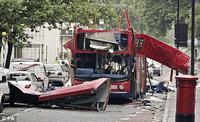
An inquest into the 7 July 2005 attack on London transportation concluded that any suggestion MI5 could have stopped the attacks was “based to a considerable extent on hindsight”; there were failures in the response by emergency workers — confusion, a shortage of first aid supplies, and radios that did not work underground, but the report concludes that government errors had not increased the death toll
-
-
Al Qaeda's plans for 9/11 anniversary: attack U.S. rail
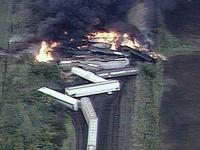
The treasure trove of documents, multimedia, and computers seized in the raid on bin Laden’s hideout is being exploited by intelligence experts for information on the terror network and future plots; on Thursday the FBI and DHS circulated to law enforcement units around the United States the first piece of information from the bin Laden raid: in February 2010 al Qaeda operatives discussed attacks on U.S. trains as a way to commemorate the 9/11 attacks; the discussions show that the planners, in order to achieve a maximum-casualty attack, were thinking of derailing a train so that it plunged into a ravine or fell off a bridge; the FBI-DHS Thursday warning urged local la enforcement to be circulated for clips or spikes missing from train tracks, packages left on or near the tracks, and other indications that a train could be vulnerable
-
-
Michelin developing puncture-proof tires
Michelin, the French tire manufacturer, has invented the “Tweel” which could make vehicles impervious to punctures or even explosions; The Tweel is a combination tire and wheel that infuses the best elements of both designs; the Tweel has no pneumatic rubber shell leaving nothing to deflate or puncture; the Tweel resembles a wagon wheel with polyurethane spokes and rubber for the treads, but is not entirely rigid as the spokes are flexible; despite these improvements in design, Tweels have several flaws that have kept them from being widely implemented
-
-
Wyoming soon to get quieter railroad crossings
Residents living near railroad crossings in Wyoming will soon be getting a break from the noise; this summer the Wyoming Department of Transportation (WYDOT) will begin analyzing the state’s noisiest crossings to determine what is needed to make these areas quieter; lawmakers appropriated $5 million to fund the improvements and local communities would be required to match anywhere from 5 to 50 percent of the project costs
-
-
Randomizing Boston Harbor security patrols
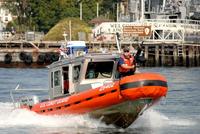
Typically, before attacking a target facility, terrorists (and criminals) watch the facility’s security routines: how often, for example, the guards patrol what section of the fence; for the facility under threat, such routines are dangerous, because they let the would-be attackers learn about gaps in security coverage, gaps than can be exploited in the attacks; USC researchers have developed a system of randomized security patrols that make it impossible for observers to predict the security patterns; LAX is already using the system, and now the Coast Guard is testing it in Boston Harbor
-
-
Rail, chemical companies recognized for safety measures
TRANSCAER (Transportation Community Awareness and Emergency Response) companies train local emergency responders through a combination of hands-on activities, emergency planning assistance, and community drills and exercises, including the use of actual rail and truck equipment, table-top exercises that discuss responses to a possible emergency situation, and whistle-stop tours that bring emergency preparedness training to response organizations in communities across the country
-
-
Inviting terror targets in New York City poorly guarded
A list of Port Authority facilities especially vulnerable to terrorist attacks inadvertently released; the list contains some of the most heavily trafficked bridges, tunnels, and transit hubs in the world
-
-
Man smuggles 600 snakes, reptiles on bus
Acting on tip-off, police in Argentina searched the luggage of a bus passenger traveling from Santiago del Estero to Buenos Aires; the luggage contained 444 boas, vipers, and other snakes; 186 endangered tortoises; 40 lizards, and an armadillo
-
-
Shortage of funds hampers Russia's rail security
Railroads in Russia are proving to be a far greater security challenge than airports; there are 18,000 train stations in Russia; the railroad operators have money to place passenger and luggage inspection facilities, radio jamming devices, and explosion-proof containers in 34 of these stations; train stations are not the only points where railroads are vulnerable to terrorist attack; a bomb can easily be planted anywhere along a train’s route; in 2010 alone, 542 instances of “objects placed on rails” were reported, as well as 101 cases of rail sabotage; some suggested fencing off the entire length of Russia’s railroad tracks — but since railroads in Russia stretch for over 82,000 kilometers, it was calculated that the funding needed for this comprehensive measure would be 13 trillion rubles; for comparison, the entire 2011 budget of the Russian Federation stands at 8.8 trillion rubles
-
-
Detecting critical flaws in railroad lines
Rails are the only thing keeping trains weighing thousands of tons travelling anywhere from 70 to 160 miles per hour grounded, thus any flaws or imperfections in these rails could result in accidents or major delays; railroads transport more than 25 percent of the goods in the United States including critical resources like coal, lumber, chemicals, and grain; one firm has developed the technology to detect flaws in rails that could cause major disruptions or delays; most flaws occur inside the rail and cannot be seen with the naked eye
-
-
Monitoring Mexican trucks operating in the U.S.
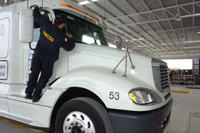
The U.S. plan to equip Mexican trucks with electronic recorders for driver logs would be a limited, temporary program undertaken because it is the only way the Federal Motor Carrier Safety Administration (FCMSA) can ensure that the Mexican trucks will be monitored, the U.S. government says; under (NAFTA), the United States cannot require Mexican carriers to do anything that U.S. carriers are not required to do, but the government still must provide a way to monitor Mexican carriers for compliance with both the hours of service rules and the cabotage rules that restrict freight hauling between points in the United States
-
-
OSI Systems to develop advanced cargo screening system
Rapiscan Systems, the security division of OSI Systems, Inc., was recently awarded a $29 million contract with DHS’ Science and Technology Directorate to develop sophisticated new cargo screening systems; the program is designed to produce the next generation of non-intrusive cargo screening systems that will be capable of automatically detecting and identifying multiple threats and contraband including explosives, narcotics, and chemical weapons in cargo containers entering the United States by air, land, and sea.
-
-
Lawmakers want cars equipped with alcohol detection devices
A bill sponsored by nine U.S. senators would provide $60 million over five years to speed up research into devices to detect alcohol on a driver’s breath, through touch on the steering wheel or through other methods; car owners could select the option when buying a new vehicle; the device would prevent the car from starting if the driver is impaired
-
-
Britain struggles to contain rampant copper thefts
Britain is struggling to stop thieves that are stealing large quantities of copper from rail yards; the cost of these thefts to the British government has doubled to roughly $1.25 billion a year; the price of copper has hit all-time highs at just over $10,000 per ton, which has driven organized gangs to conduct dangerous raids on rail way stations; the gangs climb on to the tracks and use power tools to cut down all the copper cables they can including train signaling, electricity, and data cables; thefts are expected to increase as the demand from China is projected to push copper prices even higher
-
- All
- Regional
- Water
- Biometrics
- Borders/Immig
- Business
- Cybersecurity
- Detection
- Disasters
- Government
- Infrastructure
- International
- Public health
- Public Safety
- Communication interoperabillity
- Emergency services
- Emergency medical services
- Fire
- First response
- IEDs
- Law Enforcement
- Law Enforcement Technology
- Military technology
- Nonlethal weapons
- Nuclear weapons
- Personal protection equipment
- Police
- Notification /alert systems
- Situational awareness
- Weapons systems
- Sci-Tech
- Sector Reports
- Surveillance
- Transportation
Advertising & Marketing: advertise@newswirepubs.com
Editorial: editor@newswirepubs.com
General: info@newswirepubs.com
2010-2011 © News Wire Publications, LLC News Wire Publications, LLC
220 Old Country Road | Suite 200 | Mineola | New York | 11501
Permissions and Policies
Editorial: editor@newswirepubs.com
General: info@newswirepubs.com
2010-2011 © News Wire Publications, LLC News Wire Publications, LLC
220 Old Country Road | Suite 200 | Mineola | New York | 11501
Permissions and Policies
